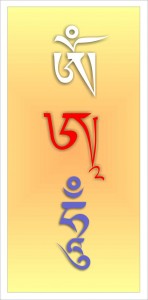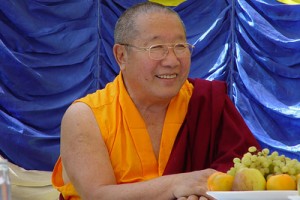
From The Spiritual Path: A Compilation of Teachings by Jetsunma Ahkon Lhamo
Students who are flirting with, considering, or entering the path may become confused by the term “pure view.” Why? Because they register the ordinary meaning of these words, unaware that they will understand more later. If at this moment we were able to awaken in the primordial wisdom state, if we were somehow able to move into Lord Buddha’s posture of being awake to that nature, pure view would be instantly established. When we first come to the path, we are excited to have found something precious. It’s like waking up on Christmas morning and discovering a gift. We realize that Dharma provides tools we didn’t have before, deeper ways to understand. We realize that we are going to be let in on a vast secret…Something that will enrich our lives, change our lives.
We enter a romantic period. We fall in love. It’s quite normal: in some ways, it is helpful. Falling in love with a person enables you to see that person’s best qualities. You become open to that person and the same thing happens with Dharma. You become receptive. Some students fall in love with the very idea of being on a path, being part of a group experience, part of something that moves together as one body, and with the idea of having a teacher. Some students fall in love with the exotic things they encounter in their Dharma practice. “Hey, this temple looks like Nepal or something! It’ll be cool to bring my friends!” Silly and superficial as this sounds, it is absolutely normal when you first come to the path. It is also normal to begin “The Great Adventure Of Imitation.” Walking the Dharma walk, talking the Dharma talk. Trying to look serenely pure upon hearing the term “pure view.” Periodically rolling the eyes skyward to appear saintly. As we try to act in a way that we think is pure, we approach Dharma externally. Materialistically. Wait! How can approaching Dharma be materialistic? Isn’t it a religion of renunciation? Unfortunately, it is very possible to practice materialistically. It’s possible to collect Dharma—and things associated with Dharma—just as we collect rare stamps or works of art.
This is all sadly far from practicing pure view. What must be pure is the way you think. When real change comes, you have nothing to show off to your friends. The change is inside. It’s very subtle, very quiet. And it grows like a seedling coming out of the soil, at first almost invisible. That is how pure view should grow.
When you enter the Dharma, what you need to protect most is your innocence. You should come almost as a child, a seeker, as someone whose mind is open. The traditional Buddhist analogy likens the mind to a bowl. Some people have dirt in their bowls: judgment and preconceived ideas. Some complacently extrapolate their own religion. Some don’t really listen to the teachings. Their bowls are turned over. As the milk of Dharma is poured, it simply runs down the sides. Some come to the path with poison in their bowls: negative habitual tendencies and negative emotions. They have a hard edge. The way for a new student to practice in harmony with pure view is to relax the mind as much as possible, to have a mind that is gentle and receptive. Where you’ve been before, what’s happened before, and even your opinion of yourself, doesn’t really matter.
What matters is what you do today. Today you can focus on self-honesty. You can closely examine your mind, what it does, how it works. You can finally see how much of what you do results from self-absorption. How much of what you do is selfish, judgmental, and manipulative. And with your new insight, you can decide to examine yourself in the mirror very squarely. You can examine your own root poisons, and you can decide to eradicate them systematically.
The best way to do that, at first, is not to act any differently, and this is why. You may correctly realize that you are now lonely because you haven’t been kind in the past. But if you simply try to act kind all the time, you will act the way you think kindness ought to look. I have watched people try it. They learn a few things about what kindness ought to be and they conduct themselves accordingly. This hampers or prevents the necessary subtle internal change. Take a rubber band and stretch it all the way out. When you let go, it will snap back to its original shape. Now, if you yourself try to change on an external or gross level without examining the teachings and without letting your mind create a new, gentle internal habit, your mind will do the same thing as the rubber band. It has a natural shape, yes, and you can make it perform. In the past, you have made yourself jump through hoops. So you can do that, you can make your mind change. But the result will be temporary, because it’s happening in a gross and inappropriate way.
So it’s better to be gentle with yourself. Let your bowl be filled with some real milk. Absorb the teachings. Listen with a pure mind. This is like taking a rubber band and rubbing it with an oil to help it expand —perhaps only slightly. Then you rub and work it a little more, actually changing the fiber of the rubber band. Eventually, it becomes a much looser thing. Eventually, that will happen to your mind. It will become looser, more spacious. It will be more receptive to truth, a place where Dharma can live. So in the beginning, pure view for students is like an honest, gentle effort. Like an innocence. Like a relaxation.
Further along the path, pure view becomes something more meaningful, more profound. It actually arises from some of the meditational practices, specifically from what is termed “generation-stage practice.” One meditates on emptiness, which is our true primordial nature, on oneself having that nature, and then one gives rise to the particular meditational deity chosen for this practice. That is to say, one’s own self appears naturally as the meditational deity. The deity symbolizes the mind of enlightenment; meditating on oneself as the deity is actually a tool. When you engage in non-virtuous activity, you don’t have much respect for yourself, although you may cover it up with arrogance. Inside, sometimes way inside, there is a person crying because that person is not happy with non-virtuous behavior. When you do generation-stage practice, that crying is satisfied. And no matter what deity you are practicing, whatever his or her attributes, there is always the quality of kindness, and there are always the elements that produce happiness. In generation-stage practice, you begin to lose the tightness of your ordinary habitual tendencies, and you begin to develop the new habitual tendency of spontaneously abiding in pure virtuous compassion. And happiness begins.
After the generation-stage practice is completed, you pray that all sentient beings will be happy. Then you close your book and put away your mala, but your practice doesn’t really end, for you are now particularly involved with pure view. Through this practice, the mind has increasingly taken on the virtue and the attributes of the deity. Even when the practice is over, you maintain deity pride. This is not a personal pride, involving conceit or arrogance. Deity pride is different. It is confidence. Courage and a confidence that begins to change your life. If you practice the deity Chenresig, for example, deeply aware that Chenresig’s main attribute is benefiting sentient beings through compassion, you will maintain, in a solid way, an inner virtuous upright quality. You will maintain the idea that compassion is your lifeblood. That this is everything to you. You declare it. You wish it. You look for it in your mind. You try to bring it out. You do your best to live it. You create the habit of kindness.
© Jetsunma Ahkön Lhamo



